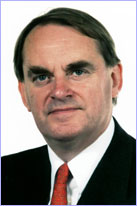The speech made by Timothy Kirkhope MEP on 30 November 2001.
It is now a truism to say that the atrocities of 11 September were a momentous event. Whether the current “fight against terrorism” ranks alongside the Gulf War or the Second World War is an academic question: what matters is that the first war of the new century is the issue of the moment.
Like the Second World War, the fight against terrorism is having as much impact on the “home front” as it does on the “international front”. In the United Kingdom, for example, the Home Secretary is playing as important a role in the conflict as the Foreign Secretary. When terrorists are the enemy, rather than states and when anthrax attacks on citizens are as much of a possibility as sniper attacks on soldiers, home affairs becomes as important as foreign affairs.
Therefore, the central question for Justice and Home Affairs ministers and spokesmen during this crisis is: ‘Should the principles that govern our actions be irrevocably and permanently changed by this crisis, or should they just be adapted for the duration of the present conflict? Let me give a few examples:
The UK Government has recently brought in retrospective legislation to deter anthrax hoaxers with penalties of up to seven years in prison. This is the first time in modern history that legislation has taken effect before being approved by the House of Commons. This law will be applied retrospectively to those who commit anthrax hoaxes between Sunday 21 October and the date Parliament approves the legislation. Naturally, I am pleased that David Blunkett has acted against anthrax hoaxers, but the precedent this legislation sets worries me. Essentially, the aim of the legislation is laudable, but the procedure used to implement must be questionable.
Secondly, the European Parliament is united in a wish to prevent terrorist groups from funding their activities from the proceeds of criminal activities such as drug smuggling. But there are worries that the principle of client confidentiality between lawyers and clients could be severely undermined by the money laundering directive proposed by the European Council. The original wording of the directive would have compelled lawyers to alert the authorities if they had “reason to believe” that their client was seeking advice for money laundering purposes. Whilst our Parliament fully agreed that client confidentiality is secondary if a lawyer “knows” about money laundering activities, the catchall “or has reason to believe” would have been is a serious blow to an important legal principle apart from its unclear meaning.
Then there is freedom of speech for elected representatives. The Chief Whip for the Labour Party in the UK responded to a Labour Member of Parliament calling for greater United Nations involvement in the fight against terrorism: “It was people like you who appeased Hitler in 1938!” As Chief Whip of the Conservatives in the European Parliament, I feel that in this case the Labour Party is mistaking constructive criticism for outright opposition. The Labour movement is known to have a long history of pacifism that should not be confused with support for Osama bin Laden.
These examples illustrate how the fight against terrorism has changed the way in which we conduct Home Affairs. There are other questions including whether traditional freedom of movement should be limited in the European Union; whether freedom of association should also be restricted; and whether the European Convention of Human Rights and the Charter of Fundamental Rights should be curtailed in the aftermath of 11 September. We need to think carefully before we act decisively and permanently.
